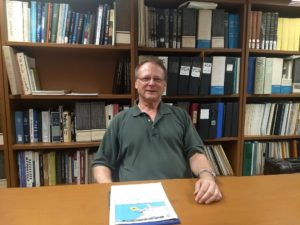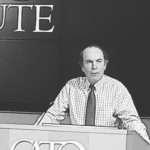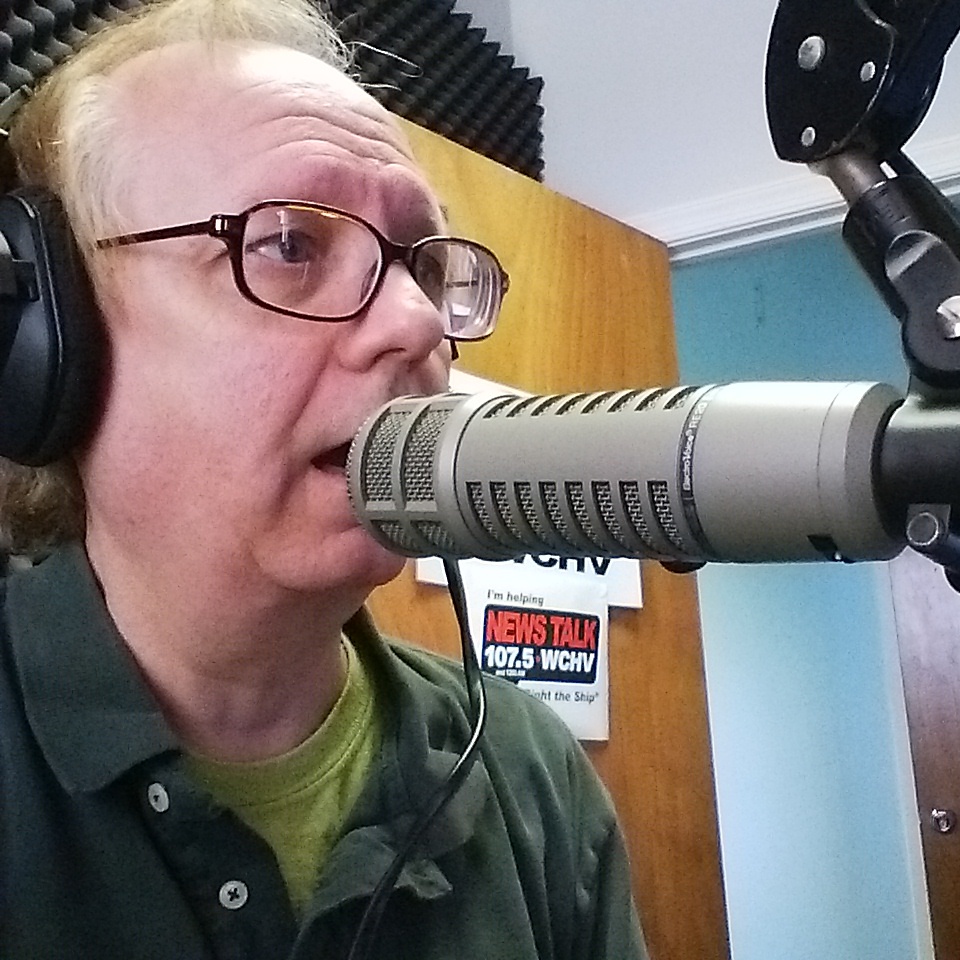The Score: Hurricane Florence, Free Speech, Solitary Confinement, Imprisoned Women
This week on The Score: Hurricane Florence lands on the East Coast. Law professors ask, Can free speech be progressive? Virginia’s ACLU releases reports on solitary confinement and women in the criminal justice system. A former federal prisoner tells her story. A look back on how the “big roads” were built.
Cyclones
 A year after Hurricane Maria devastated Puerto Rico, the top of the news this weekend is Hurricane Florence, landing on the North Carolina coast and bringing winds and rain to states from Georgia in the south to Maryland and the District of Columbia in the north. At the same time, Typhoon Mangkhut has badly damaged the Philippines en route to Vietnam and China, while Hurricane Isaac has sideswiped Jamaica as it gains strength heading into the Gulf of Mexico.
A year after Hurricane Maria devastated Puerto Rico, the top of the news this weekend is Hurricane Florence, landing on the North Carolina coast and bringing winds and rain to states from Georgia in the south to Maryland and the District of Columbia in the north. At the same time, Typhoon Mangkhut has badly damaged the Philippines en route to Vietnam and China, while Hurricane Isaac has sideswiped Jamaica as it gains strength heading into the Gulf of Mexico.
This week I spoke with Virginia’s state climatologist, Jerry Stenger, at his office in the Department of Environmental Sciences at the University of Virginia. We talked about Hurricane Camille, the most destructive storm ever to hit Virginia, and about hurricanes in general. (The final few minutes of my interview with Jerry Stenger come later in the episode.)
Free Speech and Progressives
 On September 11, the Cato Institute in Washington hosted a panel discussion on the question, “Can free speech be progressive?” The idea for the discussion came from an essay written by one of the panelists, Georgetown University law professor Louis Michael Seidman, who prefers to be called “Mike.” Seidman is the author of several books, including On Constitutional Disobedience (2013), Our Unsettled Constitution: A New Defense of Constitutionalism and Judicial Review (2001), and Silence and Freedom (2007).
On September 11, the Cato Institute in Washington hosted a panel discussion on the question, “Can free speech be progressive?” The idea for the discussion came from an essay written by one of the panelists, Georgetown University law professor Louis Michael Seidman, who prefers to be called “Mike.” Seidman is the author of several books, including On Constitutional Disobedience (2013), Our Unsettled Constitution: A New Defense of Constitutionalism and Judicial Review (2001), and Silence and Freedom (2007).
 I spoke to Professor Seidman after the discussion at Cato and then to another panelist, University of Washington law professor Ronald Collins, who I recognized from his having been a speaker at the Virginia Festival of the Book in Charlottesville in 2014. Collins is author of Nuanced Absolutism: Floyd Abrams and the First Amendment (2013), editor of The Fundamental Holmes: A Free Speech Chronicle and Reader – Selections from the Opinions, Books, Articles, Speeches, Letters and Other Writings by and about Oliver Wendell Holmes, Jr. (2010), and co-author (with David M. Skover) of The Trials of Lenny Bruce: The Fall and Rise of An American Icon (2002).
I spoke to Professor Seidman after the discussion at Cato and then to another panelist, University of Washington law professor Ronald Collins, who I recognized from his having been a speaker at the Virginia Festival of the Book in Charlottesville in 2014. Collins is author of Nuanced Absolutism: Floyd Abrams and the First Amendment (2013), editor of The Fundamental Holmes: A Free Speech Chronicle and Reader – Selections from the Opinions, Books, Articles, Speeches, Letters and Other Writings by and about Oliver Wendell Holmes, Jr. (2010), and co-author (with David M. Skover) of The Trials of Lenny Bruce: The Fall and Rise of An American Icon (2002).
In this short segment, we hear first from Professor Seidman, then Professor Collins.
Women and Prisons and the Drug War
Earlier this month, the ACLU of Virginia held its annual membership meeting at J. Sargeant Reynolds Community College in Richmond. The theme of the meeting was women ensnared in the criminal justice system, which is also the subject of a recent research paper released by the Virginia ACLU.
At the end of the meeting, I spoke with ACLU executive director Claire Gastanaga about that report and another one, which focused on the practice of putting prisoners into solitary confinement in Virginia penal facilities. Here’s Claire Gastanaga.
(In the interest of full disclosure, I should note that, for the past three years, I have been a member of the board of directors for the Virginia ACLU.)
 One of the featured speakers at the ACLU of Virginia’s annual meeting was Kemba Smith, the author of a memoir called Poster Child. She was convicted on federal drug charges in the mid-1990s and served six years of a 24-year sentence before President Bill Clinton commuted her term in 2000. I asked her about her book and her experience.
One of the featured speakers at the ACLU of Virginia’s annual meeting was Kemba Smith, the author of a memoir called Poster Child. She was convicted on federal drug charges in the mid-1990s and served six years of a 24-year sentence before President Bill Clinton commuted her term in 2000. I asked her about her book and her experience.
While we are on the topic of criminal justice reform, a few days ago I met up in Washington with Jake Grant, who writes for Young Voices Advocates. He had recently published an article showing how the war on drugs adversely affects state and federal budgets. He argues that changes in drug laws could save taxpayers billions of dollars.
From the Archives
This week our “From the Archives” segment dates back to 2012, when I spoke to Virginia author Earl Swift at the Virginia Festival of the Book in Charlottesville. Swift is the author of The Big Roads: The Untold Story of the Engineers, Visionaries, and Trailblazers Who Created the American Superhighways, a history of the U.S. Interstate Highway System and the road networks that preceded it. How does this fit in this week? It’s weather related. Swift got the idea for the book while watching a TV weather report:
The meteorologist, he recalled in an interview, “was standing in front of a map of the lower 48. As I watched, I realized that it featured no topography. It had been stripped of topography altogether. In place of mountains and rivers were the outlines of the states, a scattering of cities, and most prominently, interstate highways. The country had been reduced to a grid. I realized at the same time that that’s pretty much the way I had come to see the place, and this was a bit of revelation.”
Over the weeks that followed that morning, Swift said he had “a number of ‘mini-epiphanies’” that he came to see as related. For instance, he was able to find fresh asparagus, clementines, and strawberries in the supermarket at the same time of year, even though these fruits and vegetables have widely varied growing seasons.
“I realized that this was a relatively recent phenomenon,” he said — a result of improved road transportation that could bring produce from farm to market quickly.
“One thing led to another,” he explained. “The effects of the roads, I guess, became more apparent to me than the roads themselves.”
Come back next week for another episode of The Score from Bearing Drift. Our September 22 show is still under construction, but one guest will be Charlottesville attorney Elliott Harding, who tells us about the upcoming U.S. Supreme Court case, Gamble v. United States. We’ll also have more from my extended interview with Jake Grant, on criminal justice reform and eminent domain laws. While you’re listening, be sure to tell your friends where to find us.


